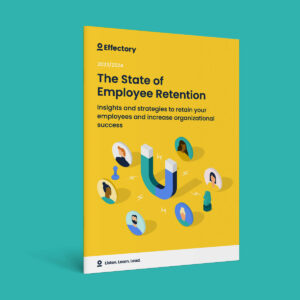Retaining skilled employees is a pressing issue in the healthcare sector. Despite the influx of new hires, research from CBS shows that many are moving on to different industries1.
Employee Retention in Healthcare: Lessons from Amsterdam UMC

A well-thought-out retention strategy is essential. Investing resources into keeping employees not only reduces costs and boosts productivity but also improves job satisfaction, paving the way for stronger organizational performance.
Success in the healthcare sector relies on tackling high turnover rates. For this, organizations need a solid retention strategy coupled with innovative solutions.
Given that it’s a matter that needs immediate attention, the topic of employee retention in healthcare was the first to kick off our EffectiveTalks webinar series.
Our host, Arjen Swank, and consultants Hanne Kuijstermans and Eline de Visser from Effectory, were joined by Yolande van der Linde, HR Director at Amsterdam UMC. They shared valuable insights and tips for healthcare leaders, which we’ve highlighted in this article.
Let’s begin by understanding the needs of healthcare professionals.
Understanding the Needs of Healthcare Professionals: Engagement Leads to Retention
According to our data, only 3% of engaged employees were looking for jobs outside their organization in 2020 and 2021. This tells us something important: healthcare organizations seeking to retain their employees will need to invest in understanding their needs and motivations. This includes aspects like work conditions, career growth opportunities, work-life balance, and the level of recognition and appreciation they receive. Regular surveys, feedback, and open communication can help get a clear picture of these needs. To learn more about engagement, read Arjen’s in-depth explanation in this article.
Amsterdam UMC’s strategy was guided by Effectory’s employee surveys and focused on what drives employees.
Yolande, HR Director at Amsterdam UMC, says, “We see that nurses are making different considerations than a few years ago. They want to be properly enabled… Nurses very much want to be taken firmly by the hand when it comes to their own development and investing in it (07:21)”.
Effectory provided Amsterdam UMC with in-depth insights into the dynamics between their leadership and their employees. The Merger Scan played an important part in this. “We developed a Merger Scan with questions for people working across the Amstel, which gave a wealth of insights,” says Yolande (21:05).
The State of Employee Retention
Uncover why employees leave, hidden costs to organizations, and proven retention strategies in our insightful report.
DownloadThe Role of Leadership and Development
In the healthcare sector, providing focused support and opportunities for career growth is becoming increasingly essential for workers. This includes access to training, continuing education, and opportunities for career development.
A positive and supportive work culture also contributes to employee satisfaction and retention. It’s about creating an environment where healthcare professionals feel valued and respected.
For Amsterdam UMC, the focus on leadership and organizational culture is a key factor. “People work with us because they are very proud of what we do,” says Yolande (16:55).
Other challenges, like an aging workforce, also impact staff turnover. Yolande points out, ” We also need to reorganize the work on the floor to be able to handle the same amount of workload, yet with fewer people.” (10:38)
So, what can HR professionals or healthcare leaders do in response?
Eline de Visser, People Strategy Consultant, says, “Combined with [employees] being willing to work less at night and things like that. The situation in healthcare is unique… because it goes on 24/7.” (15:28)
Retaining healthcare professionals requires a holistic, industry-specific and organization-specific approach that considers all aspects of job satisfaction and engagement and the dynamics between the two.
Lessons on Retention for Leaders in Healthcare
Investing in the development, support, and recognition of employees helps healthcare organizations cultivate a stable and loyal workforce.
By emphasizing development opportunities, recognition, and fostering an inspiring workplace, healthcare managers can create a positive and rewarding work culture. This approach not only boosts retention but also contributes to a higher quality of care.
Yolande shares three valuable tips for healthcare HR professionals from her experience at Amsterdam UMC.
- Stronger Together: Teamwork is fundamental in healthcare. Looking beyond our immediate environment and actively seeking collaboration with others. These initiatives open doors to innovative solutions and ways of working.
- Try and Learn: There is no one-size-fits-all solution to healthcare challenges. Flexibility, experimenting with different approaches, and learning from each attempt is key. It involves exploring different paths and finding what works.
- Give employees a voice: Giving professionals more control in their work resonates deeply. Involving them in decision-making and granting more autonomy builds an engaged and motivated team.
The motivation of healthcare workers extends beyond just appreciation from clients. It’s about understanding the factors that drive these professionals to pursue their jobs with passion.
What Drives Employees to Stay with a Healthcare Organization
In healthcare, there are three fundamental motivators that encourage professionals to stay loyal to their organization, as detailed by Hanne Kuijstermans:
- Development opportunities are crucial
Healthcare professionals strive for both personal and professional growth. This includes having access to training, ongoing education, and career development opportunities. These are vital for their expertise and greatly contribute to their overall satisfaction and loyalty to the organization.
- Inspiration at work is a key factor
Healthcare workers seek a deep, intrinsic motivation. They want work environments that fuel this passion and provide direction. A clear vision and feeling part of a larger goal are crucial in strengthening their commitment and dedication to their organization.
- Appreciation plays a vital role
This goes beyond financial rewards. It’s about recognizing individual efforts, celebrating successes and creating a work environment where employees feel supported and valued. A culture of recognition and appreciation can have a profound impact on the job satisfaction and loyalty among healthcare professionals.
How Can Healthcare Organizations Explore and Evaluate This?
Every healthcare organization is unique, with different types within the industry. However, there are common overarching factors. Effectory Consultant Eline points out, “We work with a diverse range of healthcare organizations, from VVT to disability care, youth care, and ambulance care. Despite the diversity, the challenge of scarce professions and the 24/7 nature of healthcare are unifying factors (32:28).”
To keep up with the critical pillars of retention, innovative solutions are necessary. People Strategy Consultant Hanne from Effectory says, “We can understand what’s happening within organizations through feedback from their own employees… They also give insights into what’s needed to retain them (40:40).”
Although individual employees may have different priorities, there is also a generational aspect to the focus on development. Hanne says, “You see that younger generations are eager to develop. They are also seeking career advancement and more training and courses. Those who have been in the organization longer often need support to do their job well, particularly with keeping up with digitalization (44:34).”
Eline emphasizes listening to and supporting employees in their development as important for retention. She points out that when leaders have the right tools for meaningful dialogue, they can more effectively discuss employees’ career aspirations and address any challenges, significantly reducing turnover by helping employees achieve their goals within the organization (51:59).
Effectory’s Retention Analysis is used to collect and analyze these insights, offering a detailed look into why employees may leave and assisting HR professionals in healthcare to formulate strategies that decrease turnover and boost employee engagement and retention.
How the Retention Analysis Works
Employee feedback regarding job satisfaction, engagement, development opportunities, and appreciation is crucial for gaining insights that can strategically enhance retention.
The Effectory Retention Analysis leverages this employee feedback. It helps organizations anticipate and map potential future turnover rates, keeping leaders informed and proactive when employees show signs of possibly leaving. Regular employee surveys are key in early identification of potential turnover risks.
Retention Analysis also helps HR teams and leaders better understand what drives employees to stay. “Being inspired is a very important driver and that’s where organizations can make a difference,” Hanne explains (43:16).
Moreover, the Retention Analysis is instrumental in pinpointing specific groups or individuals at risk of leaving the organization. By understanding who these employees are and their reasons for considering leaving, healthcare organizations can implement specific strategies to address these issues and ultimately reduce turnover.
Experience Effectory’s Retention Analysis
Want to know more about how we can help your organization improve employee retention and engagement? We’re to show you how the Effectory Retention Analysis can positively impact employee retention and engagement in your organization. Reach out to us for more details.
Book a free demo. See our solutions in action.
Effectory is Europe’s Leading provider of Employee Listening Solutions. Schedule a product demo and discover how to enhance your employees’ engagement.
Demo request
